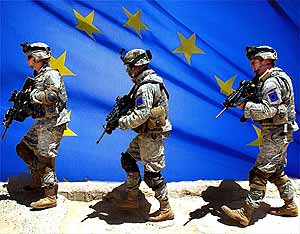European Union Building Its Own Army

On November 13, 2017, 23 out of 28 European Union (EU) states signed a declaration to create what is expected to form the nucleus of a joint European army. The five countries that won’t be taking part are Great Britain, Denmark, Ireland, Malta, and Portugal, though Ireland previously expressed some interest in joining.
The defense agreement is aimed at developing rapid reaction forces and implementing new material and equipment, including tanks and drones. It will include a five billion euro defense fund for buying weapons, as well as a special fund to finance operations and research.
Germany has almost all but spearheaded this project by itself. Just two years ago, the president of the European Commission, Jean-Claude Juncker, told the German newspaper Welt am Sonntag why Germany believes it is important to have a European army of its own.
“You would not create a European army to use it immediately,” Juncker stated. “But a common army among the Europeans would convey to Russia that we are serious about defending the values of the European Union.”
This might sound nonsensical considering NATO is currently surrounding Russia’s borders in an effort to contain Russia within an ambush of American troops and missiles. However, countries like Germany genuinely believe the U.S. can no longer protect Europe from Russia. NATO is essentially headed by the U.S., followed closely behind Great Britain, both of which cannot always act in favor of mainland Europe’s core interests given its geographical detachment (not to mention that Great Britain has opted to leave the E.U., making its influence over Europe’s military interests less apparent).
Under Donald Trump, the U.S. has formally lost the so-called global leadership role that both George W. Bush and Barack Obama had already started eroding. In May of this year, NATO officials had to Trump-proof the president’s visit, ensuring no one talked longer than four minutes to keep up with his limited attention span. In this context, Germany has openly said it can no longer rely on the United States and is reportedly seeking to take up the leadership reigns following America’s demise as a superpower.
NATO also has Turkey as a member, a country that does not always see eye to eye with Germany and has even expressed its willingness to join the Russian and Chinese-led Shanghai Bloc, instead.
Germany’s lack of a positive outlook towards NATO is significant. Germany is Europe’s largest economy. By 2020, it aims to spend 53 percent more on military equipment compared to 2016, according to a German Ministry of Defense estimate. However, though it pledged to increase the size of its armed forces to 200,000 earlier this year, it can’t realistically emerge as a superpower on its own in the face of the rising powers of Russia, China, India, and the rest of the European states. That is precisely why in February this year, Germany took matters into its own hands and announced the integration of its armed forces with Romania and the Czech Republic, baby-steps towards its very own European army.
According to Foreign Policy:
“Romania’s entire military won’t join the Bundeswehr, nor will the Czech armed forces become a mere German subdivision. But in the next several months each country will integrate one brigade into the German armed forces: Romania’s 81st Mechanized Brigade will join the Bundeswehr’s Rapid Response Forces Division, while the Czech 4th Rapid Deployment Brigade, which has served in Afghanistan and Kosovo and is considered the Czech Army’s spearhead force, will become part of the Germans’ 10th Armored Division. In doing so, they’ll follow in the footsteps of two Dutch brigades, one of which has already joined the Bundeswehr’s Rapid Response Forces Division and another that has been integrated into the Bundeswehr’s 1st Armored Division. According to Carlo Masala, a professor of international politics at the University of the Bundeswehr in Munich, ‘The German government is showing that it’s willing to proceed with European military integration’ — even if others on the continent aren’t yet.” [emphasis added]
Germany was not in a position to militarily emerge as a major superpower, but it had other ideas in mind as to how to combat that particular dilemma.
“The initiative came out of the weakness of the Bundeswehr,” said Justyna Gotkowska, a Northern Europe security analyst at Poland’s Center for Eastern Studies think tank, as quoted by Foreign Policy. “The Germans realized that the Bundeswehr needed to fill gaps in its land forces … in order to gain political and military influence within NATO.”
Foreign Policy also highlighted that Germany has to be careful as to how its neighbors, its rivals, and the rest of the world perceive a re-emerging German military given its infamous history in World War II.
Enter an E.U. army, one that would almost certainly be headed by Germany but that would encompass enough states to make it a much more formidable force (minus the negative publicity associated with Germany becoming a military power once again). Another glaring problem is that unelected E.U. officials would then be in a position to send Europe’s troops into combat as opposed to the so-called democratically elected institutions that allegedly have a mandate to decide whether or not to send its residents to die overseas.
One should also bear in mind that France, a keen backer of this project, retains a permanent seat at the U.N. Security Council, equipped with a veto power it could use on behalf of this E.U.-led bloc. Even without the U.S. and the U.K., the force would have significant sway and power to implement its will and protect its interests.
While the idea of a European army is still in its early stages, as the dynamics on the global chessboard begin to switch out of Washington’s favor, this is surely one of the more important developments to keep an eye on.

